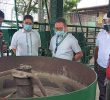Joji Ilagan-Bian, president of Six-Eleven Inc, a Davao-based call center firm, however remains very bullish about the future of the country’s call center industry. The Philippines, according to Bian, is a big player in the global market for BPO and has been cited one of the top countries worldwide for BPO investments. BPO services offered by call centers include marketing, sales, customer care, investor relations, bookings, etc.
Although the Philippines and India have the most number of call centers in the world, ” it’s fascinating to note that Indian call centers are now moving to Philippine cities,” says Bian, who also runs a large training institute in Davao for call center agents with ready jobs waiting for them in Manila and Makati call center companies. Davao ranks third in English-speaking skills in a recent survey of 12 Philippines cities.
As more and more call centers are cropping up in the major cities of Manila, Makati, Quezon, Cebu, Bacolod, Iloilo, Dumaguete, the number of qualified English-speaking applicants available nationwide is no longer keeping up with the fast-rising numbers of call centers seeking desperately for applicants.
More than a hundred call centre companies in the country are scrambling over each other today, trying to entice any English-speaking applicant they can lay their hands on—- whether very young or very old, Filipino or foreigner, parttime or fulltime, retired or moonlighters, etc.—- as long as they can speak very good English.
In one Makati-based call center, it’s not surprising to find young agents like 19 year old Sandy Tordessilllas, a student at Letran University, sitting side-by-side at the operations center with retired teacher Leonardo Manriquez, 64, from Pangasinan or even a foreigner like Maxim Motovsky, 52, a Russian trader who speaks good English and wants to earn extra money.
“As long as they speak very good English, as long as they pass our one-month training, we’ll hire them and pay them well,” says a human resource manager at Convergys, one of the country’s biggest call centers with branches in Makati, Quezon, Pasig, Bacolod and Cebu cities.
The high turnover rate in the industry is also blamed on call center training programs which failed to produce many good agents for the jobs. “Our training was a disaster. I was glad they fired me. We can’t focus and think during training at two in the morning. That kind of training doesn’t make sense to me.” says Jayson Ramirez, 34, an entrepreneur who needed extra income.
At Convergys, training managers boast to new trainees that only one out of every 100 applicants they interviewed are actually hired. “So, you’re the best, the cream of the crop!” he tells a trainee. Eventually, only 3 to 5 out of every 20 trainees survive an intensive one-month training.
Rejection and termination of thousands of English-speaking trainees in many call centers nationwide in their efforts ” to keep standards high in the industry” is costing the call center industry millions of pesos in wasted training costs, admits one training manager of Advanced Contact Solutions.
Both ACS and Convergys have “exit interviews” for all call center agents resigning or getting fired, to find out the reasons and causes of the high turnover rate in the industry. A pattern is slowly emerging from these studies—- bad training design, oppressive trainors, too much stress, too much pressure, ‘prison-like’ condition, pay not worth the effort, etc.
It may take some time to really get to the bottom of the Philippine call center industry’s abnormally high turnover rate. (davaotoday.com)










